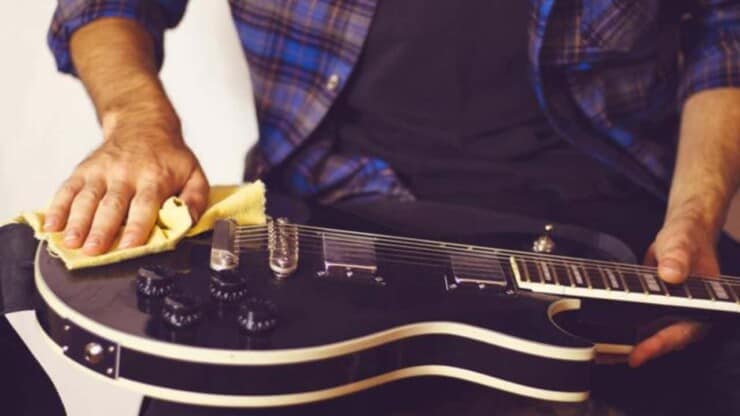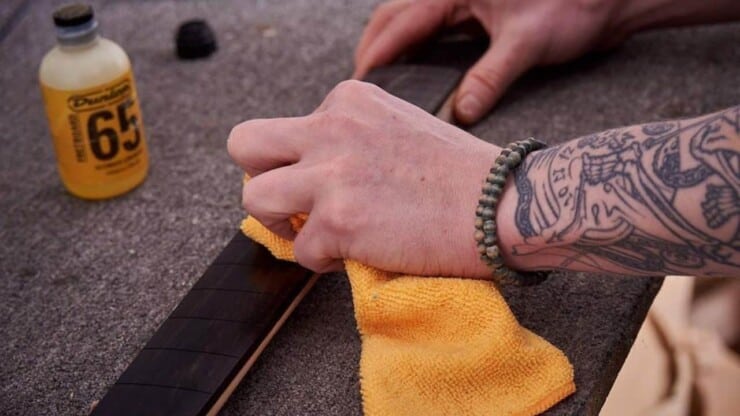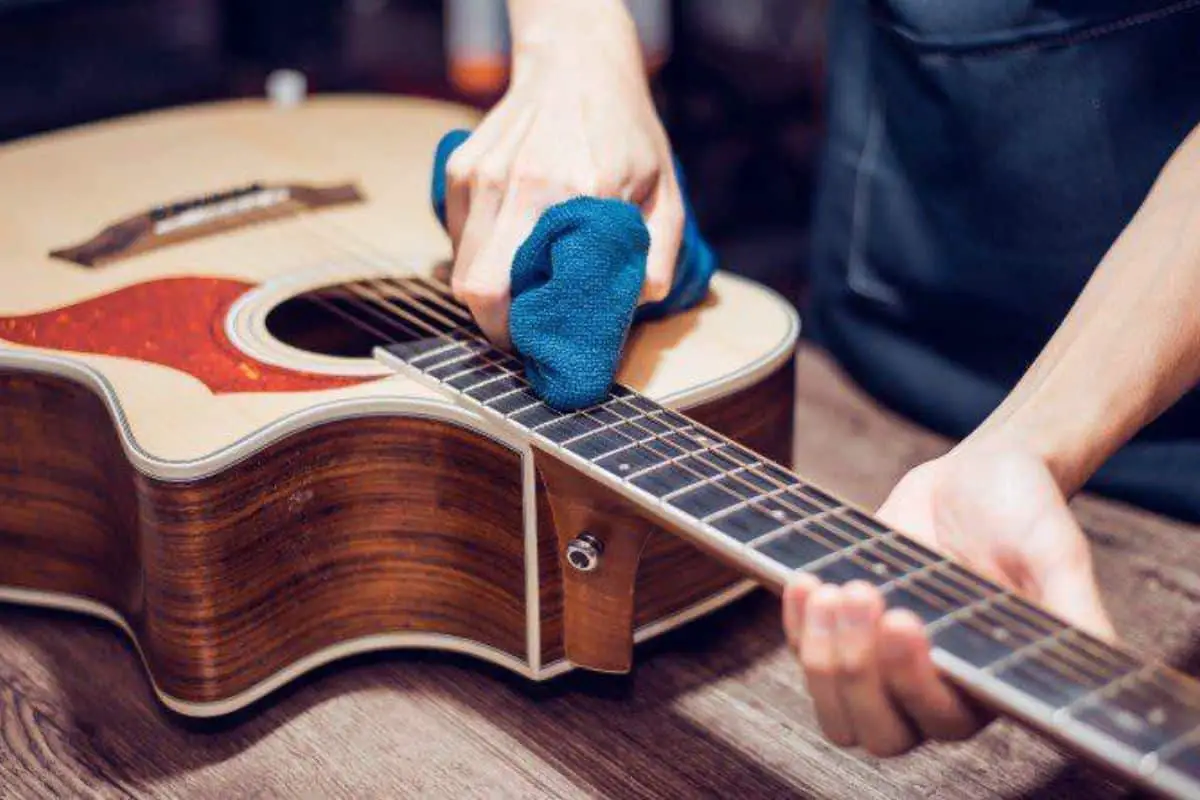Are you a guitarist looking for guitar polish alternatives to polish your guitar naturally and keep it shining? If so, then you’re definitely in the right place.
Guitar polish alternatives, especially natural ones, are in abundance. There are several household items that you can use to polish your classic guitar. Items like clean water, lemon oil, and vegetable soul are great natural polish alternatives to polish and clean your guitar.
In this article, you will get to know all about the different guitar polish alternatives, the alternatives you should avoid, why you should clean and polish your guitar, and more. Stick around to know all the answers.
Why should you clean and polish your guitar?
When you practice on your guitar, you’re transferring oil and sweat from your skin to the wood of the guitar. Your sweat is bad for your guitar as it’ll eventually work its way into the wood and break it down. While it happens slowly and gradually, it’ll still happen. Have you seen the old, vintage guitars that are covered in dirt and dust? Chances are that they can look and play significantly better if they were cleaned and polished properly. Cleaning and polishing your classic guitar will be essential. But it’ll ultimately come down to more than aesthetics and making it look pretty.
Cleaning and polishing your guitar will maintain a solid working instrument and help the hardware work better. Moreover, it will also protect the wood from filling with dirt and gunk and functioning correctly. Sweat, dirt, and dust could get into the pores of the wood and start reducing the quality of the tonewood. It can even get into the electronics of your guitar while also messing with the pickups and inner workings.
If you own a classic guitar with an expensive finish, then you should polish the body and neck routinely. Guitarists with guitars that have been customized to look old prefer not to polish them for preserving their appearance. You should remember to polish your guitar as it’ll not only keep the finish looking good, but it’ll also protect the guitar from sweat, oil, and dirt from your hands. Moreover, it’ll also protect pollutants in the air and the UV rays from the sun. All of these things can degrade the quality of your guitar’s finish over time.
READ MORE: The Best Online Guitar Learning Lessons – Review
Household guitar polish alternatives to clean and polish your guitar
The best way to clean and polish your guitar is to use items like Q-Tips, cotton swabs, or microfiber cloth. Q-tips and cotton swabs can be used for removing dirt located on the side of the frets. Use cotton balls or microfiber cloth for wiping the middle part in between frets. Make sure that you’re doing this patiently and effectively to thoroughly clean the guitar. Use some water before using perfume, oil, or any liquid with harsh chemicals that can potentially damage the guitar. Cleaning and polishing the guitar will feel different and ensure that it lasts longer. There are numerous items that you can use to clean and polish your guitar.
1. Plain water
Yes, the same water that you drink or use for showering can clean your guitar. Water is a great way if you’re looking to clean your guitar. Not only will it help you clean your guitar, but it’ll also leave it with a shiny, polished look. If in doubt, simply use water. Make sure that you’re using a microfiber cloth for wiping the dirt and dust from the guitar.
Plain water is free and readily available, and it won’t contain any harsh chemicals or health hazards. Keep in mind that you should not pour a bucket of water on your guitar and leave it soaking wet. Instead, grab a microfiber cloth and a splash of water and clean different sections of the guitar patiently.
2. Use vegetable oil soap
Another item that you can commonly find lying around in your house is vegetable oil soap. Remember, this isn’t the vegetable oil that you use to cook food in your house. It’s a special type of oil soap manufactured using water, natural fragrance, coconut-derived cleansing ingredients, and 2% synthetic ingredients. It’ll contain pure vegetable oil and 98% naturally derived ingredients, making it safe for use on any type of wood.

You will usually find them in your house, which makes them a perfect alternative to professional guitar polish. It will not contain any harsh chemicals and it’ll also clean your guitar and leave a natural, polished shine. Use a bit of oil soap with any microfiber cloth or cotton ball. After cleaning the dirt and grime on your fretboard, it’ll give your guitar a great shine. If there is a lot of dirt and dust, remove it before, and then apply the soap until you’re happy with the results.
The best thing about such wood cleaning products is that they’ll work amazingly well for the fretboard. Moreover, it’ll also work well for your guitar’s neck and body.
If you feel that your guitar has become sticky, mix the vegetable oil soap with some water. Then, use the mixture in small amounts at a time. Remember that your guitar will not need an excessive amount of soap if you’re cleaning it regularly.
3. Mineral spirits
Mineral spirits will be another great alternative as it is mild and will not harm the guitar’s finish. It’ll be well worth a try as it’ll keep your fretboard from getting sticky and dirty. However, you should be cautious. Cleaning your classic guitar sporadically with mineral spirits will be safe. However, aggressive rubbing or long exposure to the wrong type of mineral spirits will have unwanted effects on your fretboard.
Ensure that you’re using these mineral spirits as a quick guitar polish alternative and not as a lifetime solution. Moreover, you should remember to read what each of the products that you’re using is made of. On the back of the product, all the chemicals and other ingredients used will be mentioned. Some of them are marked as paint thinners or titles containing chemicals that won’t benefit your guitar in any way. Different companies make use of different chemicals and formulae. You need to be aware of those chemicals as some of them might be dangerous to your guitar.
4. Naphtha
Using Naphtha can be a little tricky, especially when applying in small amounts. It can quickly evaporate but this is the way you’d want it to work. You should only use a bit of Naphtha at a time as it’ll help you remove any oils from your guitar. It’ll be extremely useful in cleaning all the dirt and leaving your guitar with a shiny, polished finish.
However, there is something that you should keep in mind. Only use it if you already have an appropriate oil to use after this. If you don’t, the Naphtha will end up drying your guitar’s finish.
5. Lemon oil
Lemon oil is one of the best guitar polish alternatives. You can use it to clean your fretboard as the dirt and dust can be removed with ease. Moreover, once you have polished it with a microfiber cloth, it’ll give the wood a shiny look and feel.
You must be careful regarding the type of lemon oil you are using. Lemon oil isn’t the same thing as lemon juice or slicing a lemon and using it to clean your guitar. Lemon oil is a different type of product and the concentration of lemon must be close to nothing.
If you’re having lemon oil lying around in your house, it’ll be safe for use on rosewood or ebony fretboards. It will be important to ensure that you aren’t using lemon juice and the lemon oil’s concentration is not high.

There are products made specifically for guitar fretboards. Products like Dunlop Fretboard Lemon Oil are useful in keeping dirt and dust away. It’ll act as an invisible sealant, preventing any moisture and stains. Remember, you won’t be needing it a lot. It isn’t supposed to be something used for cleaning heavy dirt and grime. Instead, it’ll be used for polishing the guitar and giving it a touch of shine and gloss. Buy one of these small bottles, and they’ll last for more than a year.
These are some of the best guitar polish alternatives. There are many other liquids and polish alternatives that you can use for cleaning and polishing your guitar. The majority of guitarists out there know the significance of cleaning and polishing their guitars.
RECOMMENDED: How to Play Guitar Like a Pro – Guitar Tricks Review
Guitar polish alternatives that you should avoid using
There are times when you’re looking for alternatives but in your search, you might end up using the wrong polish. Ultimately, you’ll be better off using a cheap polish specifically made for a guitar than the wrong alternative. There are many alternatives that aren’t made for your guitars and can easily harm the finish. Such guitar polish alternatives need to be avoided.
You don’t necessarily need to spend a ton of money on getting a high-quality polishing product. However, that doesn’t mean you end up going for the wrong product because they’re cheap. Here are some of the alternatives that you must avoid at all costs.
Furniture polish
You’ll be surprised to know how many people try to use cheap furniture polish on their guitars. This is an amateur move as people think they can get away with it without harming their guitar. Some guitarists also do this as they cannot find polish specifically manufactured for their guitars at local stores.
A major mistake that many beginners make is rarely cleaning their guitar. Then, they try to use furniture polish to give their guitar a shine. Furniture polish will contain silicone oils, which can easily leave a visible film. This polish can easily react with your guitar’s finish and stain it. Moreover, it could also change its appearance permanently.
Armor All
Armor All is essentially a protectant and not polish. It is manufactured for soft surfaces like tires and automobile dashboards. However, some people make the mistake of using Armor All for polishing their guitars.
The active ingredients in the formulation of Armor All are silicone, glycerine, diethylene, and a few other harsh chemicals. While it gives a glossy finish, its protective finish can wear off quickly. Moreover, when your hands run against the guitar, it’ll make the surface incredibly splotchy and sticky.
Car polish
Another common type of polish that many guitarists try to improvise and use is car polish. There are many people who use Turtle Wax and car polish, and no one can convince them otherwise. Even if someone gives them a bottle of high-quality guitar polish, they’ll stick to car polish as it’s fairly cheap.
The reality is that you should never use car polish on your guitar under any circumstances. Car polishes are loaded with chemicals, and they’ll greatly harm your guitar’s finish. Fortunately, most first-time users of car polish realize that it’s too thick and results in a greasy-looking appearance. It must be avoided at all costs, no matter how cheap and readily available it is.
Homemade cleaners and polishes
Another common mistake that many beginner guitarists make is using homemade cleaners and polishes for cleaning and polishing their guitars. People make use of vinegar, lighter fluid, bathing soap, isopropyl alcohol, Fantastic, and Windex among other items to get a polished finish.
Needless to say, using homemade cleaners and polishes will end up damaging your guitar. In worst-case scenarios, it would wreck your guitar, leaving it unable to be played or used. Instead, you should stick to using a decent, tried and tested guitar cleaner and polisher. A quality cleaner and polisher will come fairly cheap, and it’ll last awhile.
Conclusion
Thank you for reading. Hopefully, now you know a lot more about cleaning your guitars, household items that can serve as guitar polish alternatives, the polishes that you should avoid at all costs and more. Remember, cleaning and polishing your guitar will not only make it give it a clean, glossy finish, but it’ll also improve your guitar’s performance. A clean and well-polished guitar will play better. There are several alternatives to a guitar polish that can be found at home. You should stick to those and make sure that you keep your guitar looking clean and shiny.
Image Credit:
Featured Image: Killer Guitar Rigs
Images: Music Grotto, Guitar Assembly



